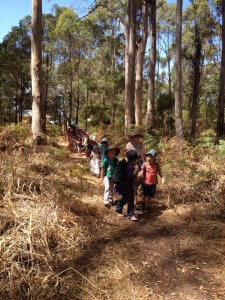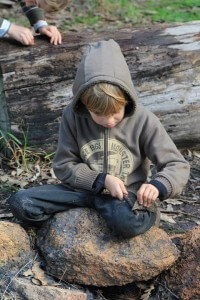
Outdoor Education and the Walkabout Curriculum
Outdoor education is part of every day at Spirit of Play, as the children are engaged in their environment within and outside of the school grounds.
Years 1 to 6 each spend one day a week on Walkabout, an opportunity to integrate all the curriculum areas in a meaningful exploration of the local environment and visiting community organisations.
We explore the world and look for occasions and ways of giving back to the land, saying thank you and appreciating this beautiful country.
The children are encouraged to help those younger or less capable than themselves. We have sharing circles aimed at deepening the connections within the group and strengthening the children’s communication and their understanding of the occasions we share. The children have a walkabout diary that allows them to keep a record of what we did each week, reflect and share with each other what was good and what was hard. These books provide the basis for further explorations as we go to the library and internet to research any queries or anything that they have been inspired by out in the bush.
I believe free imaginative play and connection with nature in childhood plays a significant role in developing children’s sense of awareness and attentiveness. I feel privileged to work at Spirit of Play where I see these things being realised.
-Kanae Jones, Educational Assistant, 2015



Connection to Nature
Revisiting special places regularly during the different seasons, allows an ongoing deepening relationship with Country that reflects each child’s development. Through reflective review as a group, individual learning becomes contextualised, personal and real. The children learn about the history of places through visiting elders of all cultures and inviting cultural facilitators to teach their stories to our children. We connect to others within our community, who are linked to these places, and particularly groups such as GreenSkills and the Denmark Weed Action Group, to share knowledge.
Contact with nature is calming, stimulating and healing. By creating things with and from nature children are learning sustainability and creativity. In a world overloaded with virtual distractions the children are given time and space to come down to earth and engage with the peace and wonder of the real world.
Nature is not always calm and soft but it will always offer us the chance to learn about ourselves and the world around us. The guided experiences and challenges our children have in the natural environment nurture the whole child, building high emotional resilience that they can use throughout life. Natural environments offer emotional harmony and visual calmness that can diffuse the stresses of everyday modern life. The open ended experiences presented are affirming and with that framework, all other aspects of development may move forward more easily.
More specifically, a connection to nature allows us to teach the importance of our collective eco-footprint, through actively caring for the places we go to. We teach and learn about each environment and discuss the impact of human activity with the hope of creating respectful custodianship. Our three overarching principles remain ‘Care for people care for land, and care for things and places’.
My hope for the upcoming generation is that they can leave the materialistic and hectic-ness behind, and balance productivity with looking after themselves, their community and their environment, to have healthy and fulfilling lives.
Pat McCarthy, Teacher, 2015.
